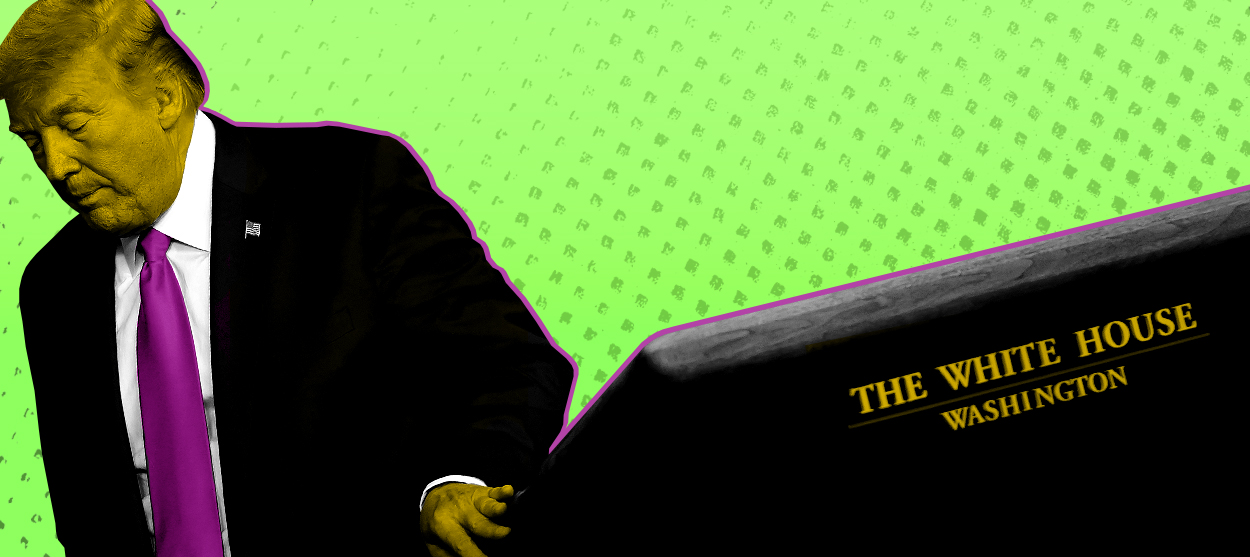Trump is throwing Georgia under the bus
The president pushed for states to reopen, but now he's backtracking


A free daily email with the biggest news stories of the day – and the best features from TheWeek.com
You are now subscribed
Your newsletter sign-up was successful
President Trump's leadership has always been inconsistent and erratic. He takes a position one day, only to reverse himself the next. This has been frustrating since the beginning of his tenure, but now, it is positively dangerous to Americans trying to survive during a global pandemic — and it is a threat to the futures of local politicians trying to follow his lead.
Trump's tendency to flip-flop was on display Wednesday at his daily news briefing. After days of signalling his support for protesters who are trying to get their states to lift quarantine conditions, the president suddenly reversed course, criticizing Georgia Gov. Brian Kemp (R), who earlier this week announced his state is lifting its lockdown.
"Would I do that? No," Trump told reporters. "But I'm going to let him make his decision, but I told him, I totally disagree."
The Week
Escape your echo chamber. Get the facts behind the news, plus analysis from multiple perspectives.

Sign up for The Week's Free Newsletters
From our morning news briefing to a weekly Good News Newsletter, get the best of The Week delivered directly to your inbox.
From our morning news briefing to a weekly Good News Newsletter, get the best of The Week delivered directly to your inbox.
You couldn't blame Kemp for being confused. Last week, Trump unveiled his administration's official guidelines for states to return to normalcy when the pandemic subsides, but then almost immediately undermined those guidelines by tweeting his support — "LIBERATE Michigan!" — for anti-lockdown demonstrators in states run mostly by Democratic governors.
"They have got cabin fever," Trump said about the protesters Sunday. "They want their life back. Their life was taken away from them."
Considering Trump's comments, plus congressional Republicans' refusal to approve aid for states and cities — an attempt to incentivize local leaders to reopen their economies — you could almost understand why a GOP stalwart like Kemp thought the smart political thing to do would be to go ahead, despite the recommendations of health experts, and try to put this state back to business.
But Kemp should've known better.
A free daily email with the biggest news stories of the day – and the best features from TheWeek.com
Among the president's defining characteristics is a certain malleability — he has shifted, on a dime, on issues like DACA, Syria, and health care. His positions are based on whatever he believes gives him an advantage in the moment, and attempts to hold him to account for these inconsistencies are often met with lies and bluster.
And it's only gotten worse since the pandemic arrived. The president has flipped frequently between pushing to end quarantine conditions and acceptance of expert recommendations to hold off. He has asserted "total authority" to order governors to reopen states, then deferred to them. Trump can't even pick a tone — in some briefings he tries to act presidential, calm, and measured, but most other days he is defensive and antagonistic. The overall impression is that he wants to claim credit but avoid responsibility.
Changing one's mind can be a good thing, if done in response to new and better information. It is less desirable to shift back-and-forth on a whim, or in response to the latest polls. Trump's decision-making is often in the second category, and is too unreliable to be considered actual "leadership."
Democratic governors, like California's Gavin Newsom and New York's Andrew Cuomo, have learned to deal with Trump during this crisis by flattering him when possible and working around him where prudent. They know at this point not to trust the president's unreliable leadership. Republican governors like Kemp, though, may feel less free to act independently — Trump is hugely popular among GOP voters, and the party's elected officials fear crossing him. So if he signals that the economy should open sooner rather than later, it is likely they'll follow his lead.
When Trump changes his mind, though, he has no problem throwing such followers under the bus. Just ask Kemp.
The Georgia governor has decided to expose his state's 10.62 million citizens to a heightened chance of death and illness from the COVID-19 virus, and now he is doing it without the political backing of the most popular figure in his party — support he had reason to believe was forthcoming. Given that most Americans aren't ready to lift the lockdown, Kemp's decision is a loser both in terms of public health and politics.
Inconsistency isn't Trump's only shortcoming. On Wednesday, he displayed his penchant for magical thinking, shoving aside assessments that a second wave of coronavirus infections could occur in the fall. "We may not even have corona coming back," he said, even though Dr. Anthony Fauci, the nation's top infectious disease expert, immediately contradicted him. That suggests the United States is in danger of being inadequately prepared — again — when and if that next outbreak happens.
But hey, the president might change his mind about that forecast in the next day or two, depending on which way the wind blows.
Want more essential commentary and analysis like this delivered straight to your inbox? Sign up for The Week's "Today's best articles" newsletter here.
Joel Mathis is a writer with 30 years of newspaper and online journalism experience. His work also regularly appears in National Geographic and The Kansas City Star. His awards include best online commentary at the Online News Association and (twice) at the City and Regional Magazine Association.
-
 Political cartoons for February 7
Political cartoons for February 7Cartoons Saturday’s political cartoons include an earthquake warning, Washington Post Mortem, and more
-
 5 cinematic cartoons about Bezos betting big on 'Melania'
5 cinematic cartoons about Bezos betting big on 'Melania'Cartoons Artists take on a girlboss, a fetching newspaper, and more
-
 The fall of the generals: China’s military purge
The fall of the generals: China’s military purgeIn the Spotlight Xi Jinping’s extraordinary removal of senior general proves that no-one is safe from anti-corruption drive that has investigated millions
-
 The billionaires’ wealth tax: a catastrophe for California?
The billionaires’ wealth tax: a catastrophe for California?Talking Point Peter Thiel and Larry Page preparing to change state residency
-
 Bari Weiss’ ‘60 Minutes’ scandal is about more than one report
Bari Weiss’ ‘60 Minutes’ scandal is about more than one reportIN THE SPOTLIGHT By blocking an approved segment on a controversial prison holding US deportees in El Salvador, the editor-in-chief of CBS News has become the main story
-
 Has Zohran Mamdani shown the Democrats how to win again?
Has Zohran Mamdani shown the Democrats how to win again?Today’s Big Question New York City mayoral election touted as victory for left-wing populists but moderate centrist wins elsewhere present more complex path for Democratic Party
-
 Millions turn out for anti-Trump ‘No Kings’ rallies
Millions turn out for anti-Trump ‘No Kings’ ralliesSpeed Read An estimated 7 million people participated, 2 million more than at the first ‘No Kings’ protest in June
-
 South Korea to fetch workers detained in Georgia raid
South Korea to fetch workers detained in Georgia raidSpeed Read More than 300 South Korean workers detained in an immigration raid at a Hyundai plant will be released
-
 Ghislaine Maxwell: angling for a Trump pardon
Ghislaine Maxwell: angling for a Trump pardonTalking Point Convicted sex trafficker's testimony could shed new light on president's links to Jeffrey Epstein
-
 The last words and final moments of 40 presidents
The last words and final moments of 40 presidentsThe Explainer Some are eloquent quotes worthy of the holders of the highest office in the nation, and others... aren't
-
 The JFK files: the truth at last?
The JFK files: the truth at last?In The Spotlight More than 64,000 previously classified documents relating the 1963 assassination of John F. Kennedy have been released by the Trump administration
